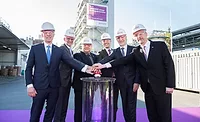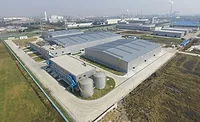AkzoNobel Opens New Membrane Electrolysis Plant in Germany
AMSTERDAM, The Netherlands - AkzoNobel inaugurated a new, highly efficient chlorine membrane electrolysis plant in the Rhein-Main area of Germany. The Frankfurt-based, state-of-the-art plant is the result of a major conversion and expansion project begun in 2011 that involved a €140 million investment by the company. Capacity has been increased by 50%, while at the same time the plant's overall ecological footprint has been reduced by some 20%.
"This investment in our Specialty Chemicals business highlights the steps we are taking to strengthen our market positions and further improve our performance as a company," said AkzoNobel CEO Ton Büchner. "We are constantly looking for new and innovative ways to improve our operational efficiency, drive our sustainability agenda and improve our service to customers."
To mark the inauguration, a special event was held for employees, customers and other business partners. Both Ton Büchner and Werner Fuhrmann, as well as Tarek Al-Wazir, Minister for Economy, Energy, Transport and Regional Development for the federal state of Hessen, attended the event.
The facility has been converted to the latest-generation membrane technology. Radical efficiency improvements will reduce energy consumption by 30% per ton of product. Boosting chlorine production capacity up to 250 kilotons per year will also reinforce the company's leading positions in Europe's chlor-alkali markets.
Work at Frankfurt started in 2011, with commercial production from the new plant expected to come on stream in the next few weeks. The site is one of three chlorine plants operated by AkzoNobel in Germany, the other two are located in Bitterfeld and Ibbenbüren.
Looking for a reprint of this article?
From high-res PDFs to custom plaques, order your copy today!







